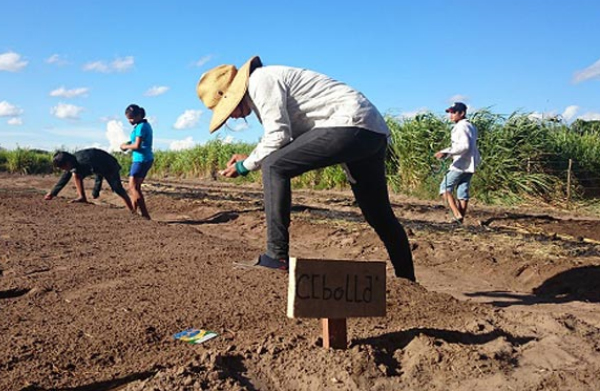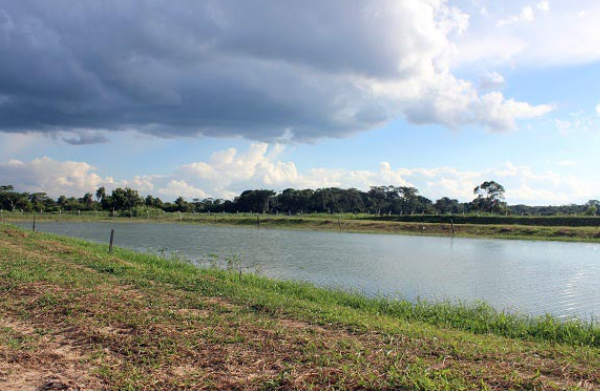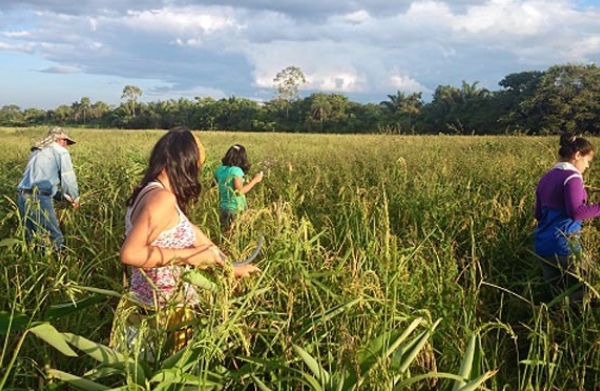Increasing Agriculture Projects at NPH Bolivia
“We have a lot of space to grow; we’re always going to try to grow a little bit every year,” Eva Hilla de Menacho, Assistant to the National Director said.
 Reported by Karl Groneman
Reported by Karl Groneman
Communication Officer, NPH Bolivia
July 26, 2016
The farm at NPH Bolivia had fallen into disuse, but since last year there have been many major projects and developments to revitalize our farms and promote agricultural sustainability.
“Our program consists of three pillars: livestock, which includes cows, sheep, and fish; the cultivation of rice and yucca; and the vegetable garden,” explained Eva. “In the beginning of 2015, the field and vegetable production was zero. We just relaunched it last year – throughout 2015. The new project focuses on initiating a field production of rice and yucca. We also plan on growing our own vegetables with the aim of saving money for it to sustain itself – for us to buy less food and to be able to pay the salaries of the farm workers.”
When asked why rice and yucca, she replied, “Rice and yucca are the basic pillars of nutrition here in eastern Bolivia. According to an estimate we did last year, we consume a total of roughly 3,000 kg of rice per year. This harvest is not yet finished, but we plan to cover about 1/3 of that consumption with our own harvest this year, which will off-set costs for other needs, and for us to plant more.”
“These two crops had never been harvested here before, but given their importance in our diet, we are expecting this agricultural project to be a big success. In the vegetable garden, for example, we are growing tomatoes, cucumbers, lettuce, radish, onion, and peppers; all the vegetables that we regularly use here for food.”
Turning to one of NPH Bolivia’s other main pillars, livestock, Eva had much to say about the fish. “That is a new project that has been planned for two years or more now. There is very high demand for fish in Bolivia, so we designed this project to be able to provide fish here for our children, but also for selling the surplus at the local markets and thereby receiving income for our operational costs. We were lucky to get the project fully funded last year and we began carrying it out in late 2015. We made two big ponds – each pond has the capacity for 3,000 fish, meaning we have 6,000 fish total. The project is now in full swing; we expect the first harvest at the end of this year.”
Fish farming is common in Bolivia, since it is a land-locked country. The most common types of fish to farm are Pacú and Surubí. The NPH Bolivia home is currently farming Pacú.
“The fish project will be the most profitable because the price per kilogram for fish on the market is extremely high, while our operational costs are very low. We were very happy to get the fish by donation, and we are very fortunate because in the long term they will profit us greatly,” Eva explained. “This year is promising to be a high yield.”
Regarding improvements to nutrition, both Eva and National Director Jaime Soria gave the same answer, “Smart buying.”
“We’re now spending less for more food by going to competitive bulk-sellers, and therefore we are now able to purchase more food, especially more meat, for our children’s consumption.”
Looking towards the future, Eva mentioned plans of planting fruit trees such as coconut, bananas, and avocados. “We have so much land; it would be amazing if we could also harvest our own fruits too, given our geographic location,” she stated.
Jaime had many other projects and ideas to share about improving the house’s nutrition and sustainability: “We are now expecting a donation of 20 milk cows, along with milking machinery. Soon we will be making all our own milk, cheese, and yogurt, with the possibility of selling the surplus locally. I would also like us to plant serebó trees, which cost very little in care and in ten years they can be sold for their wood at a high price. It would be a sustainable use of our land, given that we have so much here.”
“Sustainability is important for us at NPH Bolivia of course because of the savings aspect, but also because of the learning aspect,” Eva shared. “The children and youth help in all parts of production – seeding, harvesting, cleaning, pulling weeds, watering. Each house works for about one hour per day in agriculture. We want them to learn the importance of hard work, have a sense of responsibility and accomplishment, both of which will benefit them later on in life.”
Related Information:
• NPH Bolivia
• How Your Help Makes an Impact at NPH
• Sustainability Programs
Bolivian law prohibits us from using photos that show the faces of minors.
Photo above: Youths working in the garden. Photos below: the fish pond and vegetable garden











